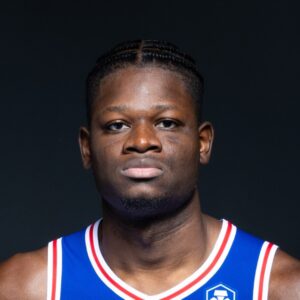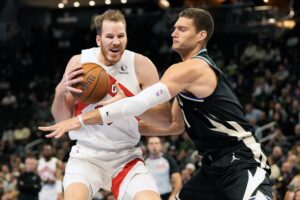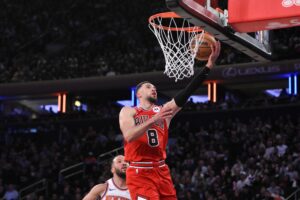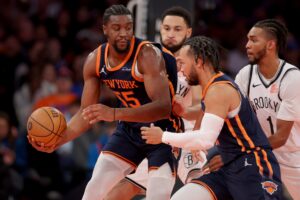The fifth overall pick of the 2015 NBA Draft Mario Hezonja, is yet to reach the heights many expected of him so far in his young NBA career. Entering his third season with the Orlando Magic franchise, Hezonja has found both minutes and success hard to come by. Orlando has enjoyed a pleasantly surprising offseason. The new front office consisting of Jeff Weltman and John Hammond have had few resources to work with. However, the Magic have enjoyed success through both the draft and free agency. Addressing some key areas this summer, it is becoming clear that the Orlando Magic must trade Mario Hezonja.
Why the Orlando Magic Must Trade Mario Hezonja
A major issue heading into the offseason was adding some offensive power to a roster that ranked in the bottom five in the league in points per game, field goal percentage and three-point percentage. Orlando went some way to tackle this problem on draft night, adding versatile forward Jonathan Isaac with the sixth overall pick; and potential 3&D prospect Wesley Iwundu in the second-round.
Both additions instantly meant fewer minutes for Hezonja. Issac will likely command the starting role, with Iwundu as the primary back-up. It has become clear that Hezonja will struggle for minutes going forward. The Croatian averaged just 14.8 minutes per game last season and failed to impress new head coach Frank Vogel. Isaac and Iwundu were both steady shooters in college averaging 50.8% and 48.1% from the floor respectively. Although it is likely those numbers will be lower in the NBA, they are both higher than Hezonja’s 35.5% from the floor last season.
Free Agency Additions
The Magic have also added competition at Hezonja’s position in free agency, signing Jonathon Simmons and Arron Afflalo, both of whom will make it increasingly difficult for Hezonja to see game time. The addition of Simmons is arguably one of the steals of the entire offseason. Signing a contract worth $20 million over three seasons, Simmons is an ideal replacement for Hezonja. Simmons’ athleticism makes him the defender Hezonja is not. Also to be considered is how former San Antonio wingman has shown signs of improvement. Simmons has worked to improve his jump shot; averaging 42% from the floor last season.
Additionally, Afflalo also adds consistency to the Magic roster, but on the other end of the floor. A proven offensive threat, Afflalo has the ability to add a three-point punch to the Magic. Having shot almost exclusively from beyond the arc last season, Afflalo hit 41.1% from deep, trumping Hezonja’s 29.9%. Bringing in Simmons and Afflalo has given the Magic consistency on both ends of the floor. Simply put, Hezonja hasn’t shown enough to earn minutes over these established players.
Failure to Adapt Means Failure to Succeed
Moving to the NBA was always going to be a challenge for Hezonja. Having played most of his young career in the EuroLeague, the transition into the NBA was not going to be easy. During his three seasons with Barcelona, Hezonja averaged a fairly respectable stat line, shooting a field goal percentage of 45.3% including 36.9% from deep. The expectation was that Hezonja would only ever improve on this, but that has simply not been the case.
A major concern for the former Spanish League champion when entering the NBA was his size and physicality. Standing 6’8″ Hezonja weighs in at just 215lbs and often gets bullied by larger forwards, especially on the defensive end of the floor. This failure to adapt to NBA standards has ultimately seen Hezonja struggle. For the Magic to trade Mario Hezonja at this juncture could ultimately be what saves his NBA career.
An increase in competition during the offseason, coupled with the already existing depth of Evan Fournier and Terrence Ross means Hezonja will have few minutes to prove himself in Orlando this coming season. If the Magic are really beginning a new chapter in the franchise history, then Hezonja could be on his way out. Despite failing to adapt to the NBA so far, Hezonja’s career is by no means over. The decision to trade Mario Hezonja now must be made before any further decline in his trade value. A lack of playing time, failure to fit into Vogel’s plans and limited improvements means it makes sense for him and the Magic to part ways sooner rather than later.
Main Photo:






